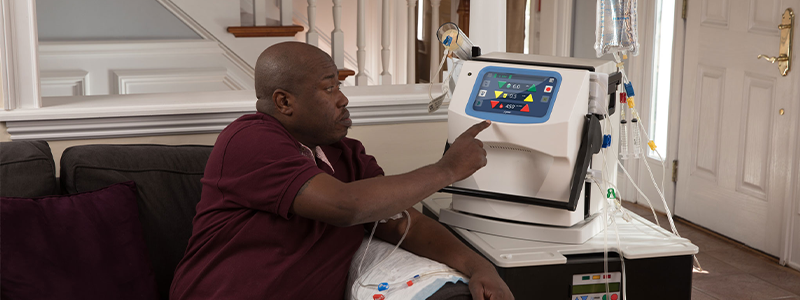Archives

In the fast-paced world of modern medicine, new innovations are continually reshaping the landscape of patient care. One such groundbreaking development is the rise of “Dialysis at Home,” a game-changing approach to managing kidney-related conditions. Gone are the days when patients had to rely solely on hospital-based dialysis centers for life-saving treatments. With home dialysis options, individuals with chronic kidney disease (CKD) or renal failure can now take charge of their health and experience a newfound sense of independence. In this blog, we will delve into the world of home dialysis, exploring its different types, benefits, and the remarkable impact it has on the lives of patients and their families.
Understanding Dialysis: A Lifeline for Kidney Patients
Before we dive into the realm of home dialysis, let’s get a clearer picture of what dialysis entails. For individuals suffering from CKD or renal failure, their kidneys are unable to efficiently filter waste products and excess fluids from the blood. Dialysis is a vital medical procedure that performs this essential function, mimicking the role of healthy kidneys and helping patients maintain a stable internal environment.
Traditional Dialysis Centers: Limitations and Challenges
Dialysis at Home: A Revolution Unfolds
Home Hemodialysis (HHD)
Home Hemodialysis, a modified version of in-center hemodialysis, empowers patients to perform dialysis treatments in the comfort of their own homes. With proper training and support from healthcare professionals, individuals can learn to use a dialysis machine to cleanse their blood, offering more flexibility and control over their treatment schedule.
Peritoneal Dialysis (PD)
Peritoneal Dialysis takes a different approach, utilizing the lining of the abdomen (peritoneum) as a natural filter. The process involves the insertion of a catheter into the peritoneal cavity, through which a cleansing solution is introduced to draw waste and excess fluids from the bloodstream. Peritoneal Dialysis offers more freedom as it can be performed both during the day and night, providing greater flexibility for patients with varying lifestyles.

The Advantages of Dialysis at Home
The transition to home dialysis brings a multitude of benefits for patients and their families:
Enhanced Quality of Life
Dialysis at home offers the freedom to tailor treatment schedules around daily activities, fostering a sense of normalcy and improved well-being. Patients can spend more time with loved ones, engage in hobbies, and pursue their passions, all while receiving life-sustaining therapy.Empowerment and Independence
Home dialysis encourages active involvement in one’s healthcare, instilling a sense of control and ownership over the treatment process. Patients become partners in their care, leading to better outcomes and increased adherence to medical recommendations.Minimized Travel and Disruptions
Say goodbye to long hours spent in transit to dialysis centers. Home dialysis eliminates the need for extensive travel, cutting down on stress and freeing up valuable time for other essential activities.
Personalized Care
In a home setting, patients receive more personalized attention from healthcare providers, leading to a deeper understanding of their condition and tailored treatment plans.Breaking Down Barriers: Who Can Opt for Home Dialysis?
Overcoming Challenges: Training and Support
To ensure the safety and efficacy of home dialysis, thorough training is essential. Healthcare professionals work closely with patients and their caregivers, imparting the necessary skills and knowledge to perform dialysis confidently.
Embracing the Future of Kidney Care
Choosing the Right Expert for Dialysis at Home
Nephrologist and Dialysis Team:
Start by consulting a nephrologist—a specialized doctor who treats kidney disorders. Your nephrologist will assess your medical history, overall health, and suitability for home dialysis. They will also play a crucial role in crafting a personalized treatment plan that aligns with your specific needs and goals.Training and Education:
A competent expert will provide comprehensive training to you and your caregiver on how to perform dialysis at home safely and effectively. The training should cover the operation of the dialysis machine (for Home Hemodialysis) or the proper technique for performing Peritoneal Dialysis. They should also educate you on potential complications, troubleshooting, and when to seek immediate medical attention.Support and Availability:
Opt for a healthcare expert and team that offer ongoing support and are readily available to address any concerns or questions that may arise during your home dialysis journey. Having a reliable point of contact is crucial for your peace of mind and ensures that help is just a phone call away whenever you need it.Communication and Empathy:
Choose an expert who communicates clearly and empathetically. They should be willing to listen to your concerns and involve you in the decision-making process regarding your treatment. An empathetic expert can make you feel more comfortable with your treatment plan and enhance your overall experience.Accreditation and Reputation:
Ensure that the healthcare expert and the facility where you will be receiving your training are accredited and have a good reputation. You can check online reviews, seek recommendations from other patients, or consult patient advocacy groups to gauge the quality of care provided.Flexibility and Adaptable Care:
Life is dynamic, and circumstances can change. Choose an expert and a treatment modality that can adapt to your evolving needs. Flexibility in your home dialysis program is essential, allowing you to adjust your schedule or treatment approach as required without compromising your health.
Patient-Centered Approach:
Ultimately, the right expert for dialysis at home will prioritize your well-being and goals. They will put your needs at the forefront of your treatment plan and collaborate with you to ensure that your home dialysis experience is as smooth and successful as possible.Dialysis at home represents an extraordinary leap in the realm of medical advancements. It empowers patients with chronic kidney disease and renal failure to seize control of their health and embrace life to the fullest. With personalized care, improved quality of life, and a sense of independence, home dialysis opens up a new era of medicine that puts the patient at the heart of the journey to better health. As we tap into the potential of home-based dialysis, we can look forward to a future where patients thrive and medical horizons continue to expand.
Other Services
Thyroid test at home
Error: Contact form not found.
You might also like
The Diagnostic Value of CT Scans
Lab test at Home Food Intolerance Doctor at Home Physio
The Vital Role of Vaccinations: Essential for All Ages
Lab test at Home Food Intolerance Doctor at Home Physio
Breastfeeding Awareness Week: Simple Tips for New Moms
Lab test at Home Food Intolerance Doctor at Home Physio

